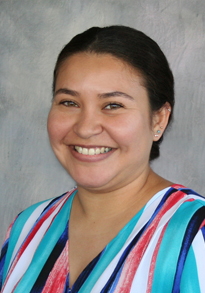Maricela Cruz, PhD
Biography
Maricela Cruz, PhD, strives to create useful and widely applicable methodology to tackle real-world problems in public health. Her research primarily focuses on developing novel statistical methods to assess and evaluate the impact of complex health care interventions. In her research, she uses statistical techniques for interrupted time series, time series, correlated data, change point detection, longitudinal data and interventions research.
Dr. Cruz received her PhD in statistics from the University of California Irvine. During her time there, she was a National Science Foundation Graduate Research Fellowship awardee and Eugene Cota-Robles fellow. She worked with care delivery experts and practitioners to design and conduct statistical analyses that assessed health care interventions across multiple hospitals and hospital units. She developed two novel interrupted time series models that allow for complex correlation structures that can change post intervention and are adequate for single- and multi-unit continuous data. To communicate and encourage access to her methods by non-statisticians in the broader public health community, Dr. Cruz produced an application in R Shiny that analyzes interrupted time series data. As a graduate student, she was a summer associate at the RAND Corporation. While at RAND, she led a collaborative study examining the relationship between group cohesion and climate with alcohol use outcomes in a group therapy intervention for individuals with a first-time offense for driving under the influence.
At KPWHRI, Dr. Cruz works alongside researchers in behavioral health, mental health, and insurance design. She explores the relationship between weight change and diabetes measures and the built environment, aids in the development of suicide risk prediction algorithms, and evaluates interventions that encourage high-value use of health care services.
RESEARCH INTERESTS AND EXPERIENCE
Recent Publications
Li D, Cruz M, Mooney SJ, Cook AJ, Bobb JF Mitigating the risk of bias exacerbation when controlling for unmeasured spatial confounding for binary exposures 2025 Nov 7 doi: 10.1093/aje/kwaf248. Epub 2025-11-07. PubMed
Cruz M, Shortreed SM, Simon GE, Coley Y Evaluating Clinical Implementation of Risk Prediction Based Interventions Using Difference-In-Differences 2025 Jul 21 doi: 10.1111/1475-6773.70015. Epub 2025-07-21. PubMed
Angerhofer JE, Cruz M, Shaw J, Stewart C, Runkle A, Wolter E, Holden E, Medlock S, Quintana L, Kuo EN, Trejo J, King R, Boggs J. Health care use preceding suicide by firearm compared with suicide by other means -- Alaska, Colorado, and Washington, 2020-2022. MMWR Morb Mortal Wkly Rep. 2025 Jun 12;74(21):365-371. doi: 10.15585/mmwr.mm7421a2. PubMed
Bobb JF, Mooney SJ, Cruz M, Vernez Moudon A, Drewnowski A, Arterburn D, Cook AJ Distributed lag models for retrospective cohort data with application to a study of built environment and body weight 2025 Jan 7;81(1). doi: 10.1093/biomtc/ujae166. PubMed
Bender M, Cruz M, Coppin JD, Williams M Examining the Relationship Between Differing Implementation Patterns of an Evidence-Informed Frontline Nursing Care Model and Implementation Success in a National-Level Study 2025 Jan;2025:9652060. doi: 10.1155/jonm/9652060. Epub 2025-10-28. PubMed
Research

Suicide attempts decreased after adding suicide care to primary care
Safety planning and risk screening improved outcomes for adult patients.
Research

Neighborhood density connected to changes in body mass index for children
Study uses geographic data to track change over time.
KPWHRI in the media
Addressing structural racism in clinical prediction models
How structural racism is impacting clinical prediction models
JSM TV, Aug. 6, 2024



